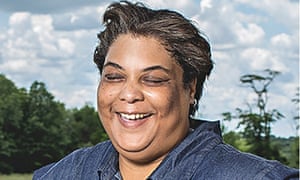Roxane Gay: the bad feminist manifesto | Global | The Guardian
Roxane Gay: the bad feminist manifesto
She wants to be independent – and taken care of. She loves rap, while finding the lyrics offensive to the core. In this extract from her latest book, a 'flawed' feminist reveals all
• Read Kira Cochrane's interview with Roxane Gay
 'The more I write, the more I put myself out into the world as a bad feminist but, I hope, a good woman.' Photograph: Jennifer Silverberg for the Guardian
'The more I write, the more I put myself out into the world as a bad feminist but, I hope, a good woman.' Photograph: Jennifer Silverberg for the GuardianShares
4,409
Comments22

Roxane Gay
Saturday 2 August 2014 18.00 AESTFirst published on Saturday 2 August 2014 18.00 AEST
Iam failing as a woman. I am failing as a feminist. To freely accept the feminist label would not be fair to good feminists. If I am, indeed, a feminist, I am a rather bad one. I am a mess of contradictions.
There are many ways in which I am doing feminism wrong, at least according to the way my perceptions of feminism have been warped by being a woman.
I want to be independent, but I want to be taken care of and have someone to come home to. I have a job I'm pretty good at. I am in charge of things. I am on committees. People respect me and take my counsel. I want to be strong and professional, but I resent how hard I have to work to be taken seriously, to receive a fraction of the consideration I might otherwise receive. Sometimes I feel an overwhelming need to cry at work, so I close my office door and lose it.
I want to be in charge, respected, in control, but I want to surrender, completely, in certain aspects of my life. Who wants to grow up?
When I drive to work, I listen to thuggish rap at a very loud volume, even though the lyrics are degrading to women and offend me to my core. The classic Ying Yang Twins song Salt Shaker? It's amazing. "Bitch you gotta shake it till your camel starts to hurt." Poetry. (I am mortified by my music choices.) I care what people think.
Pink is my favourite colour. I used to say my favourite colour was black to be cool, but it is pink – all shades of pink. If I have an accessory, it is probably pink. I read Vogue, and I'm not doing it ironically. I once live-tweeted the September issue.
I love dresses. For years I pretended I hated them, but I don't. Maxi dresses are one of the finest clothing items to become popular in recent memory. I have opinions on maxi dresses! I shave my legs! Again, this mortifies me. If I take issue with the unrealistic standards of beauty women are held to, I shouldn't have a secret fondness for fashion and smooth calves, right?
I know nothing about cars. When I take my car to the mechanic, they are speaking a foreign language. I still call my father with questions about cars, and am not terribly interested in changing any of my car-related ignorance.
Despite what people think based on my writing, I very much like men. They're interesting to me, and I mostly wish they'd be better about how they treat women so I wouldn't have to call them out so often. And still, I put up with nonsense from unsuitable men even though I know better and can do better. I love diamonds and the excess of weddings. I consider certain domestic tasks as gendered, mostly all in my favour because I don't care for chores – lawn care, bug killing and trash removal, for example, are men's work.
Sometimes – a lot of the time, honestly – I totally fake "it" because it's easier. I am a fan of orgasms, but they take time, and in many instances I don't want to spend that time. All too often I don't really like the guy enough to explain the calculus of my desire. Then I feel guilty because the sisterhood would not approve. I'm not even sure what the sisterhood is, but the idea of a sisterhood menaces me, quietly, reminding me of how bad a feminist I am.
Advertisement
I love babies, and I want to have one. I am willing to make certain compromises (not sacrifices) in order to do so – namely, maternity leave and slowing down at work to spend more time with my child, writing less, so I can be more present in my life. I worry about dying alone, unmarried and childless, because I spent so much time pursuing my career and accumulating degrees. This kind of thinking keeps me up at night, but I pretend it doesn't because I am supposed to be evolved. My success, such as it is, is supposed to be enough if I'm a good feminist. It is not enough. It is not even close. Because I have so many deeply held opinions about gender equality, I feel a lot of pressure to live up to certain ideals. I am supposed to be a good feminist who is having it all, doing it all. Really, though, I'm a woman in her 30s, struggling to accept herself and her credit score. For so long I told myself I was not this woman – utterly human and flawed. I worked overtime to be anything but this woman, and it was exhausting and unsustainable and even harder than simply embracing who I am.
Maybe I'm a bad feminist, but I am deeply committed to the issues important to the feminist movement. I have strong opinions about misogyny, institutional sexism that consistently places women at a disadvantage, the inequity in pay, the cult of beauty and thinness, the repeated attacks on reproductive freedom, violence against women, and on and on. I am as committed to fighting fiercely for equality as I am committed to disrupting the notion that there is an essential feminism.
At some point, I got it into my head that a feminist was a certain kind of woman. I bought into grossly inaccurate myths about who feminists are – militant, perfect in their politics and person, man-hating, humourless. I bought into these myths even though, intellectually, I know better. I'm not proud of this. I don't want to buy into these myths any more.
Bad feminism seems the only way I can both embrace myself as a feminist and be myself, so I write. I chatter away on Twitter about everything that makes me angry and all the small things that bring me joy. I write blogposts about the meals I cook as I try to take better care of myself, and with each new entry I realise that I'm undestroying myself after years of allowing myself to stay damaged. The more I write, the more I put myself out into the world as a bad feminist but, I hope, a good woman – I am being open about who I am and who I was and where I have faltered and who I would like to become. No matter what issues I have with feminism, I am a feminist. I cannot and will not deny the importance and absolute necessity of feminism. Like most people, I'm full of contradictions, but I also don't want to be treated like shit for being a woman. I am a bad feminist. I would rather be a bad feminist than no feminist at all.
How to be friends with another woman
1 Abandon the cultural myth that all female friendships must be bitchy, toxic or competitive. This myth is like heels and purses – pretty but designed to slowwomen down.
 Photograph: Alena Silkova/Alamy
Photograph: Alena Silkova/Alamy1a This is not to say women aren't bitches or toxic or competitive sometimes, but rather that these are not defining characteristics of female friendship, especially as you get older.
Advertisement
1b If you find that you are feeling bitchy, toxic or competitive towards the women who are supposed to be your closest friends, look at why and figure out how to fix it and/or find someone who can help you fix it.
2 A lot of ink is given over to mythologising female friendships as curious, fragile and always intensely fraught. Stop reading writing that encourages this mythology.
3 If you are the kind of woman who says, "I'm mostly friends with guys" and acts like you're proud of that, like that makes you closer to being a man or something, and less of a woman, as if being a woman is a bad thing, see item 1b. It's OK if most of your friends are guys, but if you champion this as a commentary on the nature of female friendships, well, soul-search a little.
3a If you feel it's hard to be friends with women, consider that maybe women aren't the problem. Maybe it's just you.
3b I used to be this kind of woman. I'm sorry to judge.
4 Sometimes, your friends will date people you cannot stand. You can either be honest about your feelings or you can lie. There are good reasons for both. Sometimes you will be the person dating someone your friends cannot stand. If your man or woman is a scrub, just own it so you and your friends can talk about more interesting things. My go-to explanation is, "I am dating an asshole because I'm lazy." You are welcome to borrow it.
5 Want nothing but the best for your friends, because when your friends are happy and successful, it's probably going to be easier for you to be happy.
5a If you're having a rough go of it, and a friend is having the best year ever, and you need to think some dark thoughts about that, do it alone, with your therapist, or in your diary, so that when you actually see your friend, you can avoid the myth discussed in item 1.
5b If you and your friend(s) are in the same field and can collaborate or help each other, do this without shame. It's not your fault your friends are awesome. Men invented nepotism and practically live by it. It's OK for women to do it, too.
5c Don't tear other women down, because even if they're not your friends, they are women and this is just as important. This is not to say you cannot criticise other women, but understand the difference between criticising constructively and tearing down cruelly.
5d Everybody gossips, so if you are going to gossip about your friends, at least make it fun and interesting. Never say, "I never lie" or, "I never gossip", because you are lying.
5e Love your friends' kids even if you don't want or like children. Just do it.
6 Tell your friends the hard truths they need to hear. They might get pissed about it, but it's probably for their own good. Once, my best friend told me to get my love life together and demanded an action plan, and it was irritating but also useful.
6a Don't be totally rude about truth-telling, and consider how much truth is needed to get the job done. Finesse goes a long way.
6b These conversations are more fun when preceded by an emphatic, "GIRL…"
7 Surround yourself with women you can get sloppy drunk with, who won't draw stupid things on your face if you pass out, and who will help you puke if you overcelebrate, and who will also tell you if you get sloppy drunk too much or behave badly when you are sloppy drunk.
Advertisement
8 Don't flirt, have sex or engage in emotional affairs with your friends' significant others. This shouldn't need to be said, but it needs to be said. That significant other is an asshole, and you don't want to be involved with an asshole who's used goods. If you want to be with an asshole, get a fresh asshole of your very own. They are abundant.
9 Don't let your friends buy ugly outfits or accessories you don't want to look at when you hang out. This is just common sense.
10 When something is wrong and you need to talk to your friends and they ask how you are, don't say, "Fine." They know you're lying and it irritates them, and a lot of time is wasted with the back-and-forth of, "Are you sure?" and, "Yes?" and, "Really?" and, "I AM FINE." Tell your lady friends the truth so you can talk it out and either sulk companionably or move on to other topics.
11 If four people are dining, split the bill evenly four ways. We are adults now. We don't need to add up what each person had any more. If you're high rolling, treat everyone and rotate who treats. If you're still in the broke stage, do what you have to do.
12 If a friend sends a crazy email needing reassurance about love, life, family or work, respond accordingly and in a timely manner, even if it is just to say, "Girl, I hear you." If a friend sends you 30 crazy emails needing reassurance about the same damned shit, be patient, because one day that's going to be you tearing up Gmail with your drama.
13 My mother's favourite saying is, "Qui se ressemble s'assemble." Whenever she didn't approve of whom I was spending time with, she'd say this ominously. It means, essentially, you are whom you surround yourself with.
• This is an edited extract from Bad Feminist: Essays, by Roxane Gay, published by Constable & Robinson at £12.99. To order a copy for £10.39, with free UK mainland p&p, go to theguardian.com/bookshop or call 0330 333 6846.
Topics
Feminism
Roxane Gay
Women
extracts


